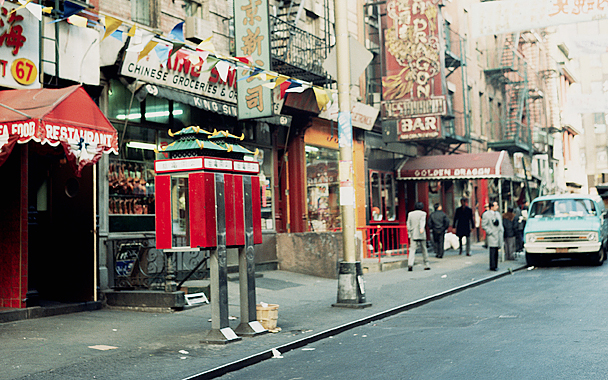When I was young enough for my pudge to still be called baby fat, Chinatown was roughly the size of New York. It was certainly all I knew of the city, and even though our address was in New Jersey, it was a version of home. My parents worked on Lafayette Street and I spent summers sitting in their office, bored, but more lovingly bored watching them use calculators and telephones than I would have been at home watching TV.
So lunchtime was important. Lunchtime we would leave our 200-square-foot perch and my parents would take me to Mott Street, just below Canal, for roast duck or wontons. Or they would take me to East Broadway, near the Bowery, for dim sum in a red-walled palace at the end of an elevator ride, the kind of place that blurred the distance between here and Hong Kong. Or sometimes they would take me up to Mulberry, into Little Italy, for linguine with clams—which, as noodles and seafood, was essentially Chinese food anyway.
But one day, with my mother at a meeting, my father took me downstairs and made rights when I expected lefts. We ended up at a corner I didn’t recognize, under a string of Grand Opening flags, those plastic triangles that always end up part of the permanent décor, Christmas-lights-in-July style. I remember the restaurant’s sign—or was it painted on the window?—blue lettering spelling Chinatown Kite in a languid, Chinoisierie cursive, the words wrapped in a kite’s tail. It was more colorful, more whimsical than any place I’d seen in the neighborhood, a place otherwise populated by joints with functional transliterated names like Sun Lok Kee Rice Shoppe.
Dad’s always been a stoical sort, but he was a little quieter than normal that day. Still, I remembered a little bit of glee when we went into the Chinatown Kite. My mother had just become a vegetarian, and he’d been waiting to come here for what was supposed to be a killer pork chop rice bowl. And while we’re at it, why not a greasy sack of fried chicken wings too?
We ate quickly, the chicken sliding down agreeably, my fatty, fat little hands grabbing plastic silverware and aiming towards our pork chops—thin, pleasantly chewy, marinated in five-spice and flash-fried, stacked on rice covered in a mince of pork and pickled mustard greens. Dad wielded one of the chops in his hand, spooning up rice with the other. He chewed with his mouth slightly open, pausing to ask me if I enjoyed it. He set his bone on the tray, finished. “I like it,” he declared, in his particular way, only ever about things he eats.
The wings built a foundation in my gut. I didn’t finish my lunch, and we took it back to work. Dad walked a little more briskly, saying that he had to get back because someone was coming from Uptown. I never knew where Uptown was, but whenever I heard Mom and Dad talk about Uptown, I knew they were talking about work, and of late, they didn’t seem too happy talking about it either.
The afternoon passed by as usual, the whirring clacks of printing calculators and me paying half attention to a Hardy Boys book: Tubby ol’ Chet’s hungry again, looking for a bite of whatever Aunt Trudy’s got going on in the oven. Mom was still gone, and Dad kept looking at the calendar and going out to say something to someone.
I thought about my pork chop. Sometimes Mom would call the bakery around the block and get them to deliver piles of sweet buns and flats of hot milky teas for all the employees. I wished she would come back soon.
Dad left again to talk to somebody. I got my pork chop and went to the microwave. Soon, the office smelled like our lunch, mellow spices and funky pickles. I sat at my mother’s desk, the hot plastic takeout container warping a little in the middle, and took my chop in one hand, spoon in the other.
A man I didn’t know walked in the door. He was tall, white, a top of thick silver hair. He was dressed in a suit. “I’m looking for your father,” he said, his accent stately and British. He looked important. He was, I was sure, from Uptown, and I was afraid to talk to him. “Um, he’s just outside,” I managed. The man looked around the room, surveying, until his eyes were on my desk. He made a face. “What,” he asked, “is that awful smell?”
I put down my chop. “I don’t know,” I said. “This food is bad,” I said. I frowned dramatically. I wiped my hands with a napkin and threw it on the rice, pushing it away from me. “I’ll go find my Daddy for you,” I said, throwing my pork chop away.




 Pinterest
Pinterest


